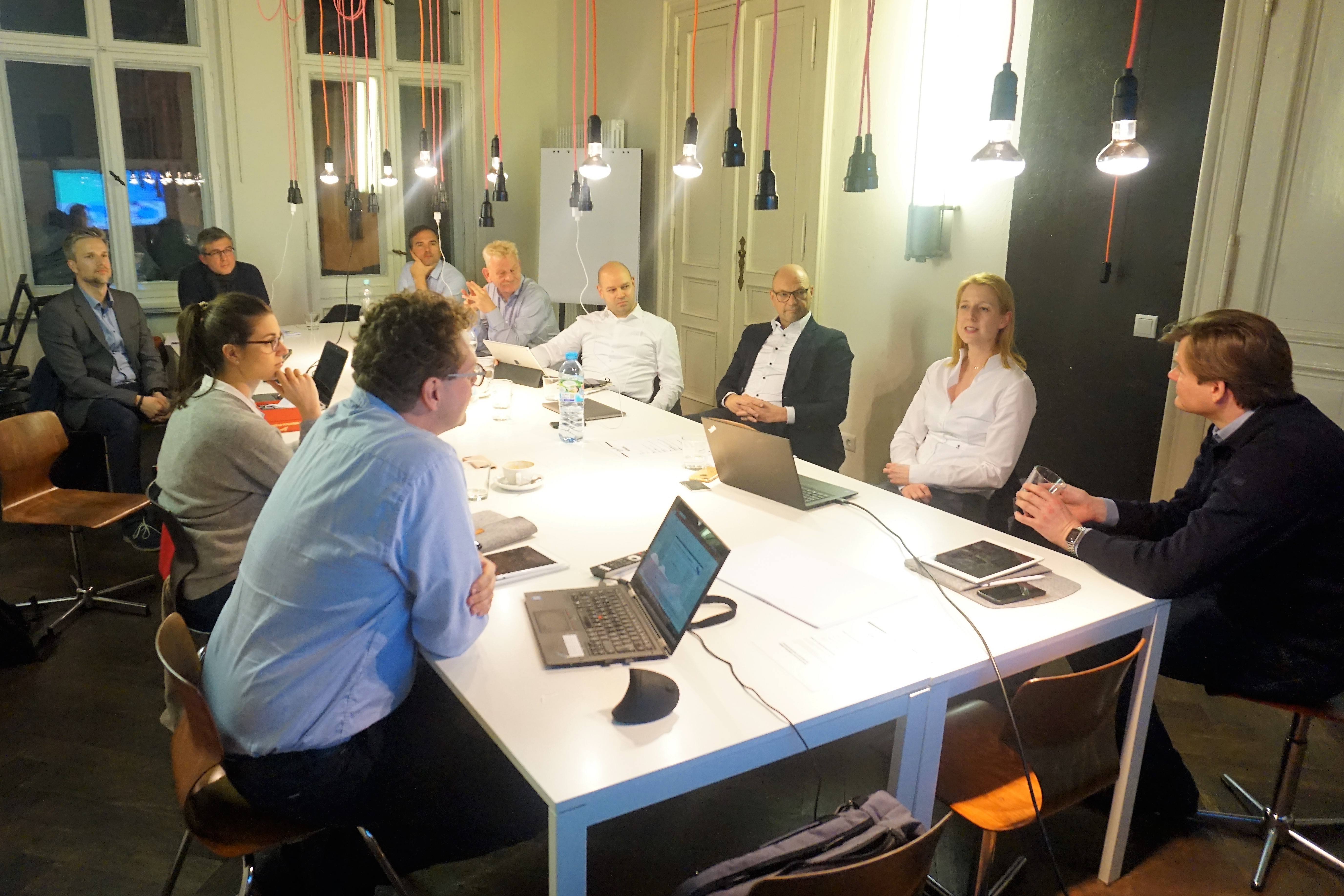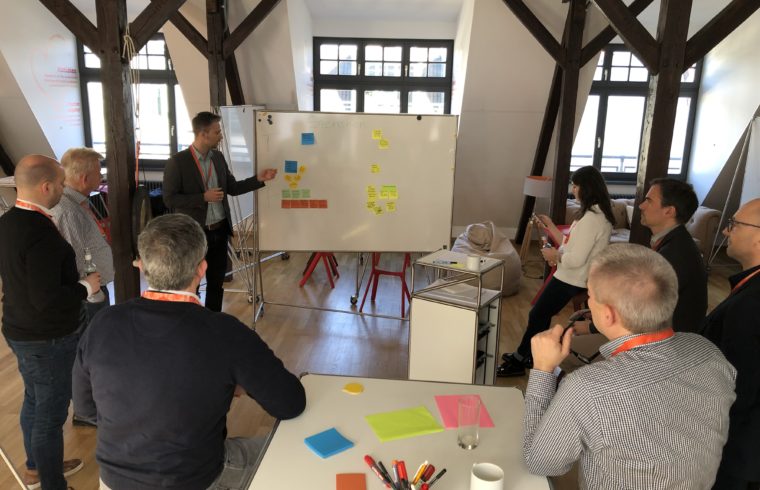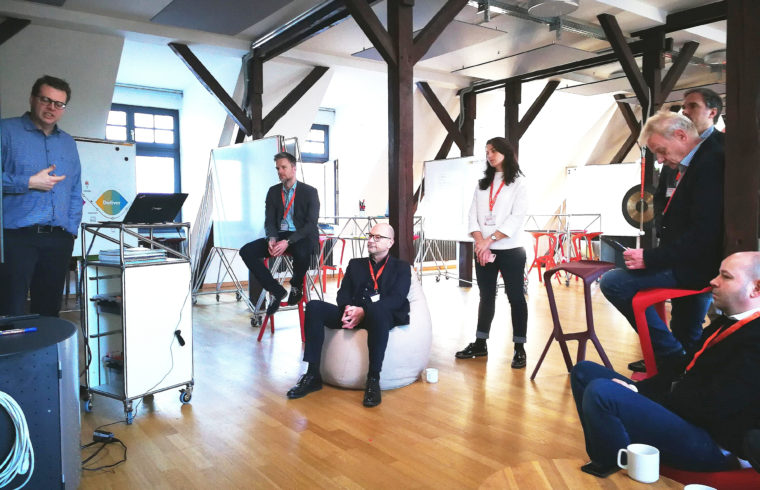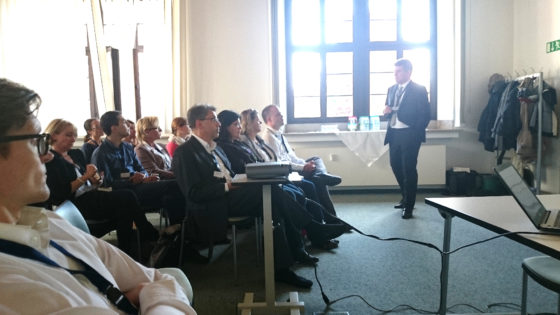„Future of Work“ heißt der jüngste ICV-Fachkreis. Am vergangenen Donnerstag und Freitag (14./15.02.2019) erlebte er in Berlin sein zweites Arbeitstreffen. Für die 10 Teilnehmenden standen am Donnerstagnachmittag im Coworking-Space „St. Oberholz“ in Berlin-Mitte ein Fachkreis-Update, danach ein Vortrag „Zukunft der Arbeit – Auswirkungen auf Berufsbilder und Tätigkeitsprofile“ von Katharina Hochfeld, Fraunhofer IAO, sowie eine Einführung in das Thema „Coworking“ durch Tobias Kremkau vom gastgebenden „St. Oberholz“ auf der Agenda. Am Freitag setzte der ICV-Fachkreis seine intensive Arbeit mit einem Design-Thinking-Workshop fort.
ICV-Fachkreisleiter Dr. Rüdiger Eichin (SAP), gab einleitend einen Überblick über den aktuellen Arbeitsstand und die nächsten Aufgaben. Der Fachkreis habe es sich zur Aufgabe gemacht, künftig an der Beantwortung einiger identifizierter Kernfragen zu arbeiten: Was sind relevante Dimensionen der Veränderung für das Controlling? Welche zukünftigen Szenarien für das Controlling können abgeleitet werden? Was sind darin zukünftig relevante Kernkompetenzen/Kompetenzprofile? Wie sieht dann die geeignete (Arbeits-) Organisation aus? Welche Methoden und Werkzeuge/Tools unterstützen dabei «agiles» Arbeiten? Was motiviert Controller heute und in der Zukunft?
Der FAK „Future of Work“ wird sich mit Kompetenzanforderungen zu beschäftigen haben. Dafür sind die Bereiche Datenauswertung und -analyse, Prozessmanagement und zunehmendes Prozess-Knowhow sowie interdisziplinäres Denken und Handeln von Unternehmen als zentrale Elemente der Kompetenzentwicklung und Personalqualifizierung benannt worden. Der ICV-Fachkreis „Future of Work“ hat in seiner Anfangsphase ein Gesamtmodell für seine Arbeit entworfen. Bisher diskutierte Aspekte ordnete FAK-Leiter Dr. Eichin fünf in Zusammenhang stehenden Dimensionen zu. Die identifizierten Treiber der Veränderung ordnete er in die drei Dimensionen Technologien & Verfahren, Organisationale Strukturen sowie Functional Focus ein. Ein FAK-Fokus liegt auf den Auswirkungen des Wandels, in der vierten Dimension „Kompetenzen & Rollen“. Für die erfolgreiche Gestaltung des Wandels schließlich spielt laut FAK-Leiter auch die fünfte Dimension, „Mindset und Motivation“, eine wichtige Rolle als Katalysator der Veränderung.
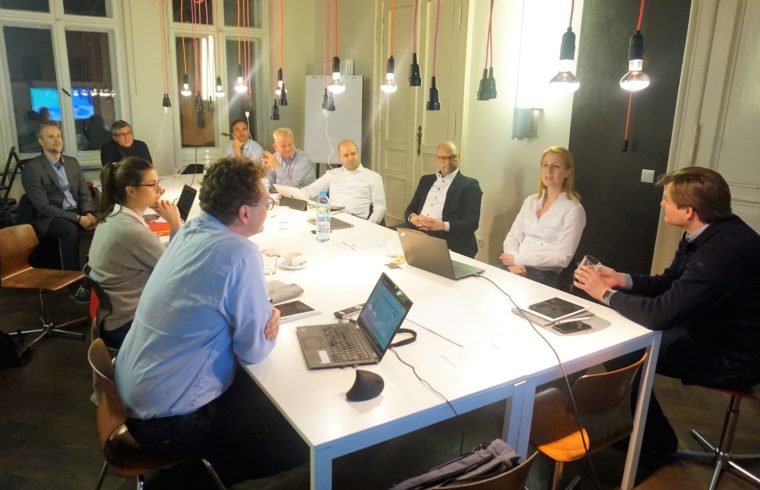
Mit ihrem Vortrag, „Zukunft der Arbeit – Auswirkungen auf Berufsbilder und Tätigkeitsprofile“, gab Katharina Hochfeld (Bild: 2.v.r.), stellvertretende Leiterin Center for Responsible Research and Innovation Fraunhofer IAO, diverse Anknüpfungspunkte für Fragen und Diskussionen. Unter anderem betonte Hochfeld, dass Digitalisierung nicht alleine aus der Technologieentwicklung heraus gestaltet werden kann. Der digitale Wandel bedürfe auch eines unternehmenskulturellen Wandels. Die grundlegenden Veränderungen der Unternehmen durch die Digitalisierung gelten sowohl für interne Prozesse wie für das Ökosystem.
Dass neue Arbeitsräume den Anforderungen digitalisierter Arbeit gerecht werden sollen, bedeutet für die Referentin: flexiblere Arbeitskonzepte, die Auflösung traditioneller Berufsbilder, dynamische Organisationsstrukturen, heterogene Belegschaften, den Wandel des Führungsbildes wie auch dynamische und flexible Karrierekonzepte. Laut Katharina Hochfeld erkennen die Unternehmen ein „Qualification Gap“: die Mitarbeitenden würden nicht mehr als ausreichend qualifiziert eingeschätzt. Entsprechend müssten sich Aktivitäten und Maßnahmen, um die digitale Transformation zu gestalten, auf die Weiterbildung von Mitarbeitenden fokussieren. Hochfeld riss in ihrem Vortrag auch die Tätigkeiten der Controller an, die sie als „vielfältig und in Veränderung“ befindlich charakterisierte: „Auch das Selbstverständnis ändert sich. Neue Funktionen entstehen, andere werden überflüssig.“
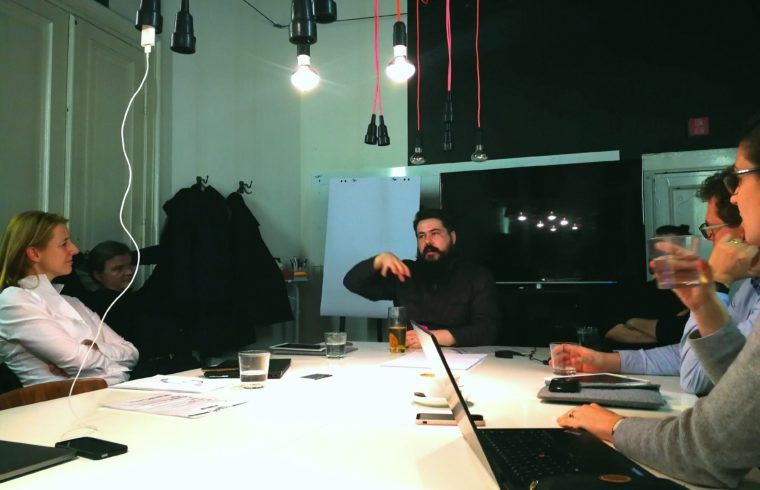
Mit einem perfekt improvisierten Vortrag begeisterte danach Tobias Kremkau (Bild: Mitte), Head of Coworking im St. Oberholz in Berlin und Mitgründer der German Coworking Federation (GCF). Über zwei Cafés in Berlin Mitte erschließt die Louca & Oberholz GbR zwei alte Gebäude für die Öffentlichkeit in Form von Coworking Spaces und Teambüros. Hinzu kommen beim St. Oberholz die Gemeinschaftsprojekte B-Part am Gleisdreieck und Blok-O in Frankfurt/Oder, ebenfalls „neue Orte der Arbeit“. Als perfekter „Storyteller“ ließ Kremkau seine Zuhörenden in die Welt des Coworking eintauchen. Für ihn ist Coworking kein Hype, der wieder vorbeigeht. Vielmehr sieht Kremkau darin einen tiefgreifenden und nachhaltig die Arbeitswelt verändernden Trend. Zum Beginn, vor inzwischen 14 Jahren, dominierten klar Freischaffende die Szenerie, die mit ihren MacBooks in Cafés saßen und „ihr Geklicke auf der Tastatur auch noch Arbeit nannten“. Heute bestimmen neben Freischaffenden und Startups immer mehr Festangestellte und Teams aus Unternehmen das Bild in Coworking Spaces. Aus unterschiedlichsten Gründen, „guten und schlechten“, lassen Unternehmen ihre Mitarbeitenden in Coworking Spaces arbeiten. „Doch egal warum, wenn eine Firma keine zum Coworking passende Unternehmenskultur hat, ist das Vorhaben sowieso zum Scheitern verurteilt“, zeigte sich Kremkau überzeugt. Mit Blick auf die aktuell von der SPD angestoßene Debatte um ein „Recht auf Homeoffice“ meinte der studierte Politikwissenschaftler und profunde Kenner der neuen Arbeitswelt, Arbeitgebende sollten ihre Belegschaft selbst entscheiden lassen, wie sie arbeiten möchte; im Büro, im Coworking Space oder auch zu Hause.
Am Freitag setzte der ICV-Fachkreis seine Arbeit im AppHaus der SAP in Berlin-Mitte an seinem Gesamtmodell mit einem von Dr. Eichin (Bild: links) geleiteten Design-Thinking-Workshop fort. Dieser brachte intensive Stunden, zunächst Szenarien für die Zukunft der Arbeit im Controlling zu entwickeln. Die Fachkreismitglieder begannnen anschließend, daraus abgeleitet Wirkungen und Anforderungen für Kompetenzen und Rollen im Controlling abzuleiten. Erneut erwies sich die SAP mit dem AppHaus als hervorragender Gastgeber des ICV-Fachkreises.
“Future of Work” is the name of the youngest ICV expert work group. Last Thursday and Friday (14/15.02.2019) it had its second working meeting in Berlin. On Thursday afternoon in the coworking space “St. Oberholz” in Berlin-Mitte the work group update was planned for the 10 participants, followed by a speech “Future of work – effects on job profiles and job descritions” by Katharina Hochfeld, Fraunhofer IAO, and an introduction to the topic “Coworking” by Tobias Kremkau from the host “St. Oberholz”. On Friday, the ICV expert work group continued its intensive work with a Design Thinking Workshop.
The ICV expert work group leader Rüdiger Eichin (SAP) started with an overview of the current work status and the next tasks. The expert work group has set itself the task to answer some identified core questions: What are relevant change dimensions for controlling? Which future scenarios for controlling can be derived? What are relevant core competencies / competence profiles in the future? What does the appropriate (work) organization look like? Which methods and tools support “agile” work? What motivates controllers today and in the future?
The expert work group “Future of Work” will have to deal with competence requirements. For this, the areas of data evaluation and analysis, process management and increasing process know-how as well as interdisciplinary thinking and acting of companies have been named as central elements of competence development and staff qualification. The ICV expert work group “Future of Work” designed an overall model for its work in its initial phase. The head of the expert work group Dr. Eichin organized the so far discussed aspects in five related dimensions. He classified the identified drivers of change in the three dimensions of technologies and processes, organizational structures and functional focus. One of the expert work group’s focuses is the effects of change, in the fourth dimension: competences & roles. Finally, according to the head of the expert work group, the fifth dimension: mindset and motivation plays an important role as a catalyst of change for the successful shaping of change.
Katharina Hochfeld (picture: second from the right), Deputy Head of the Center for Responsible Research and Innovation Fraunhofer IAO, opened a discussion with her speech “Future of work – effects on job profiles and job descritions”. Among other things, Hochfeld emphasized that digitization cannot be based solely on technology development. The digital transformation also requires a cultural change. The fundamental changes that companies are undergoing as a result of digitization apply to both internal processes and the ecosystem.
The fact that new workspaces should meet the requirements of digitized work means for the speaker: more flexible work concepts, the dissolution of traditional occupational profiles, dynamic organizational structures, heterogeneous workforces, the change in leadership, as well as dynamic and flexible career concepts. According to Katharina Hochfeld, the companies recognize a “qualification gap”: the employees would no longer be rated as sufficiently qualified. Accordingly, activities and measures to shape the digital transformation would need to focus on employee training. In her speech, Hochfeld also teased the activities of the controllers and characterized them as “multifaceted and in change”: “The self-image also changes. New functions emerge, others become superfluous.”
Tobias Kremkau (picture: middle), Head of Coworking in St. Oberholz in Berlin and co-founder of the German Coworking Federation (GCF) enthused the participants with a perfectly improvised speech. Louca & Oberholz GbR is opening up two old buildings for the public in the form of coworking spaces and team offices via two cafés in Berlin Mitte. In addition, there are the joint projects B-Part at the Gleisdreieck and Blok-O in Frankfurt/Oder at St. Oberholz, also “new places of work”. As a perfect “storyteller”, Kremkau immersed his listeners in the world of coworking. For him, coworking is not a hype that passes by again. Rather Kremkau sees in it a profound and sustainable trend changing the working world. At the beginning, 14 years ago, freelancers clearly dominated the scene, sitting in cafés with their MacBooks and “called their clicks on the keyboard also ‘work’”. In addition to freelancers and start-ups, more and more permanent employees and teams from companies are shaping the picture in coworking spaces. For a variety of reasons, “good and bad,” companies have their employees work in coworking spaces. “But no matter why, if a company does not have a corporate culture suitable for co-working, the project is doomed to failure anyway,” Kremkau said with conviction. In view of the current debate on a “right to a home office” initiated by the SPD [Germany], the graduate of political science and profound connoisseur of the new working world said that employers should let their employees decide how they want to work; in the office, in the coworking space or at home.
On Friday, the ICV expert work group continued its work on its overall model in the AppHaus of SAP in Berlin-Mitte. Dr. Eichin (picture: left) led the design thinking workshop. Intensive hours of work, first to develop scenarios for the future of work in controlling. The members of the expert work group began then to derive effects and requirements for skills and roles in controlling. Once again, SAP proved to be an excellent host of the ICV expert work group with the AppHaus.

